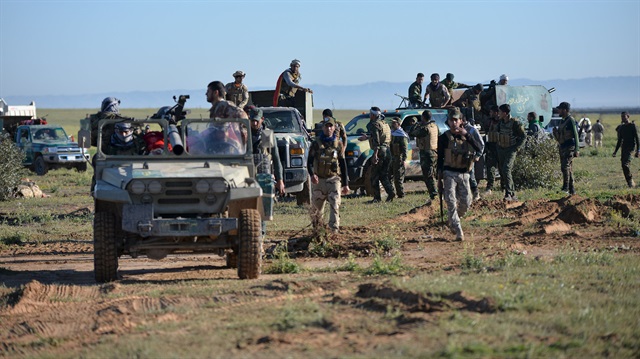
As the assault on Mosul is withstanding heavy clashes, the city could be the center of a sectarian conflict in the region's aftermath of taking control away from the Daesh terrorist group.
The Mosul operation is expressed as one of the most complicated operations in the region not only for the different views and ideologies of fighting groups, but also for regional powers who have longstanding plans to control the area through sectarian conflicts.
The central government in Baghdad, Iraqi forces, counter terrorism units, Peshmerga fighters and Iran-backed Shi'ite militias all are taking part in the Iraq-led mixed forces.
The involvement of the Iranian-backed Shi'ite militias and PKK terrorist group were questioned by the other forces of the coalition in the Mosul operation, because the people of the city are mainly Sunni.
They fear that if the Shiite militias actually take part and enter the city there will be reprisals.
Sectarian conflicts in the region had started with the Iranian revolution in 1979 and was fueled in 2003 with the United States' invasion into Iraq.
Along with the Iranian revolution, the distrust among the states in the region, open to foreign invasion, the empowering of the non-state actors since 1980 and by the terrorist groups gaining enough power in the region are fueling the sectarian conflict.
Iran's Shi'ism expansion policy, which also attempts to export this policy in the neighboring country, becomes another important factor for the conflict.
Following the establishment of Hezbollah, which aimed to fight against Israel in South Lebanon, there was a move toward the Iranian policy of Shi'ism. Sunni states like Saudi Arabia had tried to set up an anti-Iran block with the United States.
The U.S. invasion in Iraq and Afghanistan following the 9/11 terror attacks was the breaking point of Shi'ite-Sunni conflicts in the region.
After the ousting of the Saddam regime, Iraq had been actively divided into three parts: Baghdad-centered Shi'ite areas, the Erbil-centered Kurdish region and Sunni populated Mosul and surrounding areas.
The Shi'ite government in Iraq, which came into power in 2005, had thrown out the Sunni groups from the administration.
Prime Minister Nouri Al-Maliki followed the same line with Iran and oppressed Sunnis in the country.
Thus, he changed the demographic structure in Baghdad, Tikrit and Ramadi. All these cities were turned into Shi'ite populated cities whereas they were mostly Sunni populated before Maliki began ruling.
In Lebanon, the Shi'ite Hezbollah group gained more power in 2006 with the support of the Tehran administration.
However, the civil war in Syria and Yemen provide Iran a great opportunity to implement its long-planned Shi'ite expansionist policy.
It continued a proxy war over the Houthi militia in Yemen and Fatemi Shi'ite groups in Syria, who have been imported from Afghanistan and Pakistan.
Now the same strategies are going to be implemented in Mosul through the Shi'ite Hashdi Shaabi militia group.
Mosul could face one of the largest massacres in Iraq, if the militia group enters the city center.
This could spread a wider Shi'ite-Sunni conflict in the whole Middle East region.


















